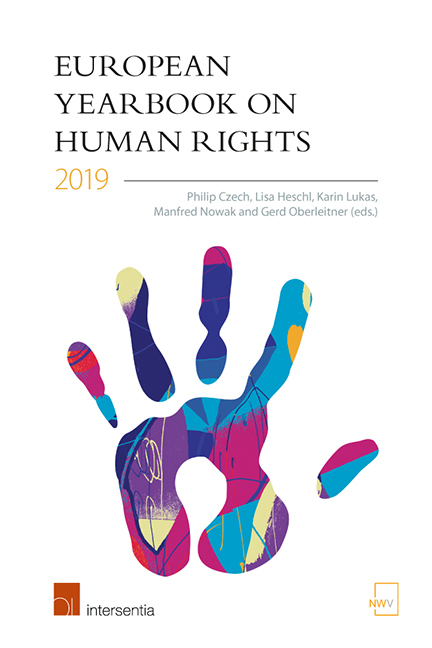Book contents
- Frontmatter
- Miscellaneous Frontmatter
- Editors’ Preface
- Contents
- List of Abbreviations
- List of Contributors
- PART I TOPIC OF THE YEAR
- PART II EU
- PART III CoE
- PART IV OSCE
- PART V REPORTS FROM THE FIELD
- PART VI OTHERS
- The Legal Authority and Recognition of the Universal Declaration of Human Rights: Conceptions, Developments and Practice
- Teaching Human Rights at School: A Survey of Persisting Challenges to the Practice
- Human Rights Implications for Vulnerable Migrants in Light of the EU and Italian Migration Policies
- The Russian Constitutional Court as a Mediating Link between Russian and European Law?
- PART VII BOOK REVIEWS
- Index
The Russian Constitutional Court as a Mediating Link between Russian and European Law?
from PART VI - OTHERS
Published online by Cambridge University Press: 24 January 2020
- Frontmatter
- Miscellaneous Frontmatter
- Editors’ Preface
- Contents
- List of Abbreviations
- List of Contributors
- PART I TOPIC OF THE YEAR
- PART II EU
- PART III CoE
- PART IV OSCE
- PART V REPORTS FROM THE FIELD
- PART VI OTHERS
- The Legal Authority and Recognition of the Universal Declaration of Human Rights: Conceptions, Developments and Practice
- Teaching Human Rights at School: A Survey of Persisting Challenges to the Practice
- Human Rights Implications for Vulnerable Migrants in Light of the EU and Italian Migration Policies
- The Russian Constitutional Court as a Mediating Link between Russian and European Law?
- PART VII BOOK REVIEWS
- Index
Summary
ABSTRACT
One of the main ambitions of the Russian Constitutional Court from the moment of its establishment has been to work as an intermediator between Russian law and the Western legal tradition, reshaping the former by bringing it closer to the latter. Such a role gave to the Court a justification for its existence in Russian law where this Court has never had any real power of constitutional control over the political authorities and their enactments. Human rights have been an important topic in these intermediating activities of the Court which actively utilised the human rights language to change the statist perspective common to Russian legal education, scholarship and practice of law. The topic of human rights turned out to be of great importance for the self-legitimation of the Court in Russian law and for aligning Russia with the European legal standards. Changes in the state ideologies in the 2000s involved for the Court the need to reconsider its approaches and to employ more conservative interpretations of human rights. After a number of discrepancies with the European Court of Human Rights, the Venice Commission and other European institutions, the Court increasingly relied on exceptionalist argumentation. In author's opinion, with this the Court not only abandons its original function in the Russian legal system, but also could lose its institutional niche in Russian law. Assuming to have the sovereign power of exception, the Court could enter into an indirect normative conflict with the presidential power.
INTRODUCTION
The main argument of this contribution is that one of the main ambitions of the Russian Federation Constitutional Court (the RF CC) was and still is to work as an intermediator between Russian law and the Western legal tradition, reshaping the former by bringing it closer to the Western legal culture. Playing this role, the RF CC continues the Soviet legal tradition, according to which the educational function was among the most important tasks of Soviet courts. For the RF CC this role means a powerful tool for self-legitimation and serves as a good argument for maintaining the constitutional justice as an independent branch of the judiciary. Playing this role, in the first years of its existence the RF CC widely employed Western liberal conceptions to change the statist perspective common to Russian legal education, scholarship and practice of law.
- Type
- Chapter
- Information
- European Yearbook on Human Rights 2019 , pp. 547 - 566Publisher: IntersentiaPrint publication year: 2019



